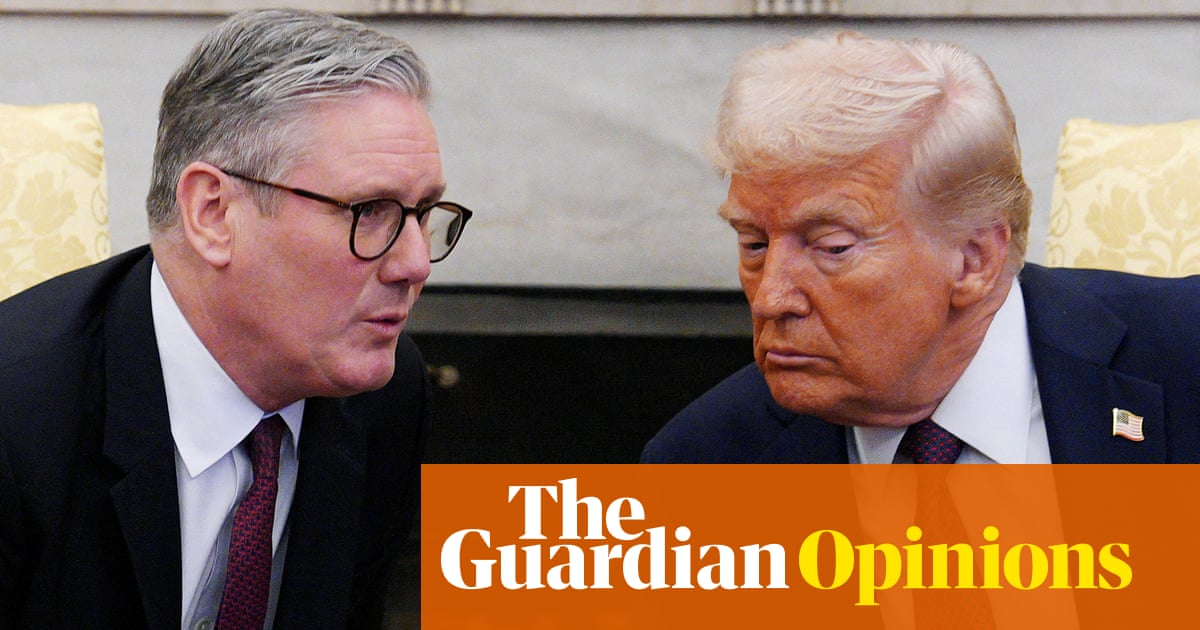It’s not funny, of course – livelihoods if not actual lives depend on reaching a workable accord. But the news that President Trump has probably stiffed the UK into a second- or third-tier boarding group for trade talks, behind South Korea and Japan, triggers at least a snort of recognition for anyone who has experienced versions of that dynamic. The phrase “British negotiators are hopeful” followed almost immediately by use of the word “disappointed” in heavy rotation takes you, with grim amusement, back to every toxic relationship in which you have played Britain to someone else’s America.
We are talking, of course, about the wisdom or otherwise of appeasing a man many think of as a tyrant, and the main takeaway from theGuardian’s story on Tuesdayis that no matter how the UK pretzels itself to fit Donald Trump’s requirements, none of it will make any difference. Or rather what difference it makes, beyond the immediate relief enjoyed before the flattery wears off, is likely to be negative. It’s a rule of extortion that demands will increase with each capitulation, as Columbia University isfinding out to its cost. (Aftercaving to Trump’s demandslast month in return for the restoration of $400m in federal funding, the university has not, in fact, had its funding restored. Instead Trump officials have told Columbia its concessions only represent the “first step”.)
And now the UK finds itself in a similar pickle to Columbia, with any goodwill generated by King Charles’s letter inviting Trump to Balmoral apparently thrown up in the air. (One thing I’ll say for the royals is that their use ofpassive-aggressive semiotics in the invitationare absolutely world class: Balmoral is a mid-list palace that, while superior to Blenheim, which Trump visited in 2018 and is basically an off-site for corporate events these days, is decidedly not Buckingham Palace – a subtlety we must assume the king and his cohorts are thoroughly enjoying and Trump has no idea about whatsoever.)
Anyway, where does any of this leave the UK? For now, at least, belligerence seems to be getting the better results with Trump, at least for those negotiators who have something he wants. Trump has blinked repeatedly when faced with the negative consequences of his own erratic behaviour, be that from tech companies forcing him toexempt them from tariffsor business leaders persuading him, in the wake of his commitment to putting145% tariffson Chinese goods, to wobble and admit they’re not sustainable.
The fact is that Apple, Target and Walmart all have greater leverage over Trump than the UK does, which is why watching this latest episode of the special relationship unfold brings on, at least in British viewers, feelings of something like pathos. How many times will we keep going back? Clearly the prime minister’sjolly humouringsecures better outcomes than Volodymyr Zelenskyy’s first approach at the White House, which has since been corrected to a necessary attitude of fealty. Meanwhile Canada, of all places, is now the nation telling the US in themost strident termsto take a step back and get stuffed.
As in all these things, it’s the hope that kills you. Maybe if Britain says exactly the right words in the right order, keeps its breathing to a minimum, manages not to say anything annoying until we’re on the other side of the trade deal, lowers its eyes away from Europe or other allies that might trigger the rage of the aggressor, and continues to laugh at his jokes and listen to his stories, it will succeed in changing the pattern of Trump’s behaviour.
The fact that this outcome is considered in any way achievable is perhaps the saddest thing of all. It’s an odd quirk of British-American diplomacy that, despite the vast disparity in power and wealth between the two countries, the sense of exceptionalism on both sides is probably equal. We really do believe we can talk our way out of anything, even when dealing with someone as capricious as Trump – a man for whom no amount of appeasement will hold longer than his mood. The king will be mobilised. The choice of Balmoral for Trump’s summer visit will rest in part on the fact that it’s harder for demonstrators bearing helium-filled balloons in the shape ofTrump-as-a-babyto reach.
And the diplomatic game will continue. Nothing Trump does seems strategic, but it seems both a calculated humiliation and a warning shot to steer clear of Europe to push the UK down the running order of trade talks. The question, then, becomes one of whether Britain’s poker face is a piece of canny diplomatic froideur and blithe UK negotiating or the uncertain actions of the party in an abusive relationship who understands that the moment of greatest danger is when you try to leave.
Emma Brockes is a Guardian columnist
